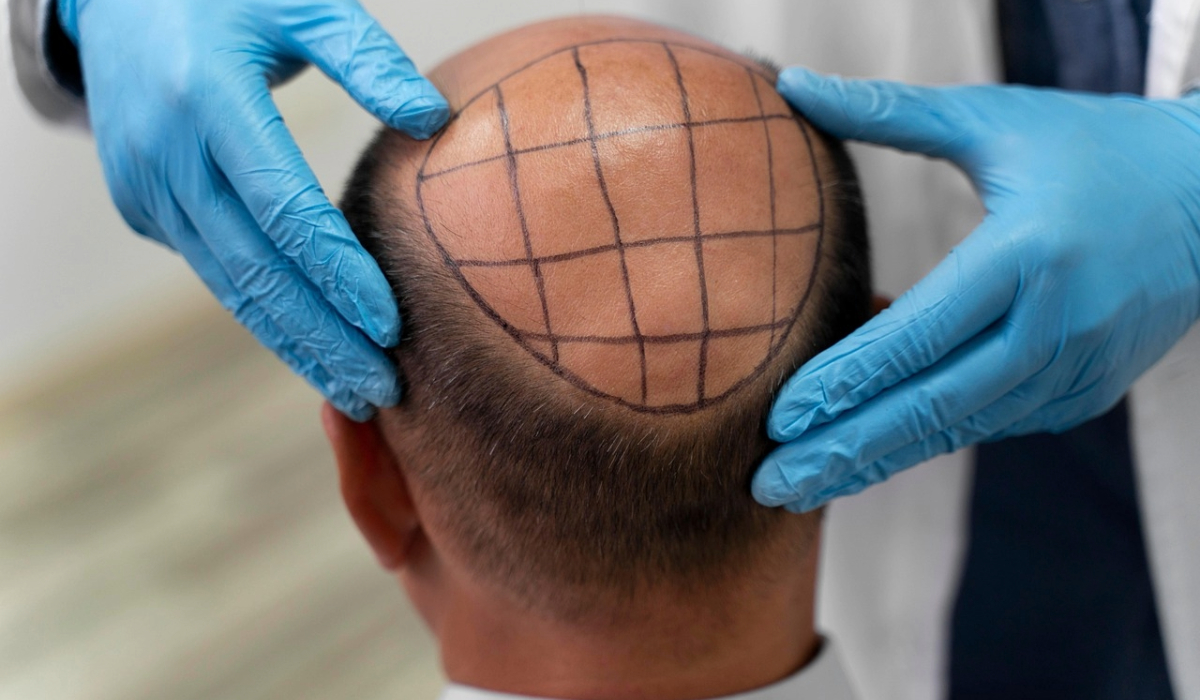A Comprehensive Guide
When you notice changes on your scalp, like itching or flaking, it could be a sign of a scalp disorder. These conditions can affect anyone, regardless of age or health, and can significantly impact your quality of life. Understanding these disorders and knowing how to manage them medically can help you live more comfortably. This guide aims to provide a thorough overview of common scalp disorders, their symptoms, causes, and the latest in medical management and home care strategies.
Understanding Scalp Disorders
Scalp disorders are a group of conditions that affect the skin of your scalp. Two common ones include seborrheic dermatitis, known for causing dandruff and red skin, and tinea capitis, a fungal infection that leads to hair loss. Recognizing these can be the first step toward getting the right treatment.
Common Types and Symptoms
Scalp Psoriasis: Red Patches and Silver Scales
Scalp psoriasis is a condition where your scalp develops red, itchy patches covered with silvery scales. It can be uncomfortable and sometimes embarrassing, but there are treatments that can help manage the symptoms. Keeping your scalp moisturized and using medicated shampoos are common ways to control flare-ups.
Seborrheic Dermatitis: Flaky, Itchy Scalp
Seborrheic dermatitis causes a flaky, itchy scalp and can also affect your face, especially around the nose and ears. According to the American Academy of Dermatology, good scalp hygiene and using special shampoos can help control this condition and reduce discomfort.
Tinea Capitis: Fungal Infection Leading to Hair Loss
Tinea capitis, a fungal infection, can make your scalp itchy and cause hair loss in patches. It’s especially common in children but can affect adults too. Treating it usually involves antifungal medications prescribed by a doctor, and it’s important to treat it early to prevent spreading to others.
Lichen Planus: Bumps and Hair Loss
Lichen planus is another condition that can affect your scalp, leading to purple bumps and hair loss. Although it’s less common than other scalp disorders, those who have it know the discomfort and aesthetic concerns it can cause. Treatment options are available to help manage the symptoms and improve your scalp’s health.
Alopecia Areata: Sudden Hair Loss Patches
Alopecia areata is a condition where you suddenly lose hair in patches. It can be shocking and distressing, but treatments can help regrow hair in many cases. Working closely with a dermatologist is key to finding the best treatment plan for you.
Causes and Risk Factors
Scalp disorders can be caused by a variety of factors, including genetics and lifestyle choices. Both men and women can experience a receding hairline, which can sometimes indicate an underlying scalp condition. Understanding these risk factors can help in preventing and managing scalp disorders.
Genetic Predispositions
Genetics play a significant role in many scalp disorders. If your family members have had issues with their scalp or hair, you might be more likely to experience similar problems. Knowing your family history can help in early detection and treatment of these conditions.
Environmental Triggers and Lifestyle Factors
Environmental triggers like pollutants and allergens can aggravate your scalp, leading to disorders. Lifestyle factors, including diet and stress, also play a crucial role. For example, a receding hairline can sometimes be managed by addressing these underlying factors, alongside medical treatments.
Immune System Disorders
Some scalp disorders, like tinea capitis, are directly related to the health of your immune system. A weakened immune system can make you more susceptible to infections, including fungal ones that affect the scalp. Keeping your immune system strong through a healthy lifestyle and proper nutrition is an important part of managing these conditions.
Diagnosing Scalp Disorders
Diagnosing scalp disorders accurately is crucial for effective treatment. Tinea capitis, for example, requires specific tests to confirm. A professional diagnosis can help determine the best course of treatment for your condition.
Professional Diagnosis Procedures
Diagnosing scalp disorders often involves checking for signs of thyroid disease and other underlying conditions. A thorough examination by a dermatologist is the first step in identifying the exact cause of your symptoms.
Physical Examination
During a physical examination, your doctor will look closely at your scalp and hair for signs of disorders. They may also ask about your symptoms and health history to better understand your condition. This examination is a critical part of diagnosing and eventually treating scalp disorders.
Laboratory Tests
Laboratory tests are a key step in finding out what’s wrong with your scalp. They can show if you don’t have enough iron, a problem called iron deficiency. This is important because not having enough iron can make hair loss worse. Doctors might also check for other things in your blood that could be causing problems with your scalp.
Biopsy for Accurate Identification
Sometimes, to know exactly what’s going on, your doctor might need to take a tiny piece of your scalp to look at more closely. This is called a biopsy. It helps them see the details of what’s happening under a microscope. This way, they can give you the right treatment for your specific problem.
Preparing for Your Appointment
When you’re getting ready to see your doctor, make a note of all the symptoms you’ve noticed. This helps your doctor understand your situation better.
Symptoms Documentation
Writing down your symptoms is very helpful. Include when they started and how they’ve changed over time. For example, if you’ve noticed your hair falling out more than usual or if your scalp feels very itchy or sore. Also, write down if heart disease runs in your family, as it can be linked to some scalp diseases.
List of Current Medications
Make a list of all the medicines you’re taking right now. This includes vitamins and supplements, too. Your doctor needs to know all this to understand if your scalp problems might be a side effect of something you’re already taking.
Questions to Ask Your Dermatologist
It’s good to have questions ready for your dermatologist. You might ask about the differences between lichen planus and lichen planopilaris, or if iron deficiency could be affecting your scalp. Ask about the anagen phase of hair growth and if your condition impacts this. Getting answers will help you understand your condition better.
Medical Management Strategies
There are different ways to help your scalp feel better, depending on what’s wrong. Your doctor will know the best approach.
Treatment Options for Scalp Disorders
For problems like an itchy scalp, there are treatments that can help. Your doctor might suggest special shampoos or medicines.
Topical Treatments and Medications
For many scalp problems, applying medicine directly to your scalp can help. This might include creams with salicylic acid or coal tar. These treatments help with itching and can make the scales or flakes go away.
Systemic Treatments for Severe Cases
If your scalp problem is really serious, your doctor might suggest medicine that works throughout your whole body. These are called systemic treatments. They can help when other treatments haven’t worked.
Light Therapy for Scalp Psoriasis
For scalp psoriasis, a special light treatment might be suggested. This can help heal your scalp by using light in a safe way. It’s another option if creams or medicines haven’t helped you.
Health Tools and Home Remedies
There are simple things you can do at home to help your scalp. For example, using mineral oil can help with cradle cap on a baby’s scalp.
Over-the-Counter Solutions
There are products you can buy without a prescription that might help your scalp feel better. This includes special shampoos for dandruff or itchy scalp. Always read the label and use them as directed.
Natural Oils and Supplements
Some people find that natural oils or taking certain vitamins helps their scalp. But it’s important to talk to your doctor before trying these, to make sure they’re right for you.
Stress Reduction Techniques
Believe it or not, stress can affect your scalp. Practices like meditation or yoga can help reduce stress. This might help your scalp problems get better, too.
Living with Scalp Disorders
Living with scalp disorders can be challenging, but with the right care and support, you can manage your symptoms and enjoy a good quality of life. It’s important to follow your treatment plan and pay attention to your daily routine to keep your scalp healthy.
Daily Care and Maintenance
Taking care of your scalp every day is crucial for managing symptoms and preventing flare-ups. Gentle care and avoiding triggers can make a big difference in how you feel.
Gentle Hair Care Products
Choosing the right hair care products is essential when you have a scalp disorder. Look for gentle, fragrance-free shampoos and conditioners. These products are less likely to irritate your scalp. Sometimes, board-certified dermatologists recommend specific products that fit into your treatment plan. Always test a new product on a small area of your scalp before using it fully.
Avoiding Irritants and Triggers
Knowing what triggers your scalp disorder is key to keeping symptoms under control. Common irritants include certain hair products, stress, and extreme weather. Try to avoid these triggers as much as possible. If you’re not sure what’s causing your flare-ups, keeping a diary of your symptoms and activities can help you identify patterns.
Impact on Mental Health and Coping Mechanisms
Scalp disorders can affect more than just your physical health; they can also impact your mental well-being. Finding ways to cope with the emotional side of living with a scalp disorder is important for your overall health.
Support Groups and Counseling
Joining a support group or seeking counseling can be very helpful. Sharing your experiences with others who understand what you’re going through can provide comfort and valuable advice. Professional counselors familiar with chronic skin conditions can also offer strategies to manage stress and improve your mental health.
Building a Positive Self-Image
Living with visible symptoms of a scalp disorder can be tough on your self-esteem. Focus on things you like about yourself and remember that your worth isn’t defined by your appearance. Dressing in ways that make you feel confident and practicing self-care can also boost your self-image. Surround yourself with supportive friends and family who uplift you.
When to Seek Further Medical Advice
If your symptoms worsen or you develop signs of an infection, it’s important to seek medical advice. Early intervention can prevent complications and adjust your treatment plan if necessary.
Signs of Infection or Worsening Symptoms
Be on the lookout for signs of infection such as increased redness, warmth, swelling, or pus on your scalp. If your symptoms suddenly get worse, contact your healthcare provider.
Crusting of the Scalp
Crusting on the scalp can indicate an infection or severe flare-up of your condition. If you notice crusting, especially if it’s accompanied by pain or swelling, it’s time to see your doctor. They may prescribe medications to help clear the infection.
Severe Hair Loss and Scalp Pain
While some hair loss can be normal, sudden or severe hair loss, along with scalp pain, should not be ignored. These symptoms can signal that your scalp disorder is worsening. Your doctor might need to adjust your treatment plan or explore other causes of hair loss and scalp pain.
Preparing for Follow-up Appointments
Keeping track of your symptoms and how well your treatment is working is important for your follow-up appointments. This information helps your doctor understand your condition better.
Tracking Changes and Treatment Efficacy
Write down any changes in your symptoms, both improvements and any new issues, since your last appointment. Note how well the treatment plan is working and any side effects you’ve experienced. This record will help your doctor assess the efficacy of your treatment.
Adjusting Treatment Plans as Necessary
Based on your feedback and any new symptoms, your doctor may adjust your treatment plan. The goal is to find the most effective way to manage your scalp disorder with minimal side effects. Open communication with your doctor is key to tailoring your treatment plan to your needs.
Promising Research and Future Treatments
Research into scalp disorders is ongoing, with new treatments being explored to improve patient outcomes. Advances in understanding the genetic and environmental factors contributing to these conditions offer hope for more targeted and effective therapies in the future. Staying informed about the latest research can give you insight into new treatment options that may become available.
Advances in Dermatological Treatments
Recently, there have been significant breakthroughs in treating scalp disorders. One promising area is corticosteroid injections, especially for bald spots caused by alopecia areata. These injections help reduce inflammation, encouraging hair to grow back in those areas. Alongside, advanced treatments are continually being developed, offering new hope to those suffering from persistent scalp conditions.
Gene Therapy and Stem Cell Research
Gene therapy and stem cell research represent the frontier of treatments for scalp disorders. Scientists are exploring how to use these technologies to correct the underlying genetic issues causing conditions like scarring alopecia and other autoimmune disorders. By targeting the problem at its source, these advanced treatments have the potential to provide long-term solutions, rather than just managing symptoms.
New Medications on the Horizon
Exciting new medications are in development, aiming to tackle scalp disorders more effectively. These include drugs designed to regulate the immune system’s attacks on hair follicles in conditions like alopecia areata and systemic lupus erythematosus. These advancements promise not only to improve symptoms but also to offer a better quality of life for those affected by chronic scalp conditions.
Summarizing Scalp Disorders and Their Care
Managing scalp disorders effectively involves understanding the condition, seeking professional diagnosis, and following through with the recommended treatments and home care practices. Early intervention and a proactive approach can significantly improve outcomes.
Key Takeaways for Effective Management
Effective management of scalp disorders hinges on early diagnosis, understanding the causes, and a combination of medical treatments and home care. This approach helps in not only treating the symptoms but also in addressing the underlying issues.
Importance of Early Diagnosis and Treatment
Identifying and treating scalp disorders early can prevent the conditions from worsening and lead to better management outcomes. Diseases like seborrheic dermatitis and tinea capitis are more manageable when diagnosed early, emphasizing the importance of seeing a healthcare provider at the first signs of trouble.
Integrating Professional Care with Home Practices
Combining professional medical treatments with home care practices forms a comprehensive approach to managing scalp disorders. Regular shampooing with gentle products, avoiding irritants, and using over-the-counter solutions as recommended by a dermatologist can significantly aid in recovery and symptom management.
Navigating the Challenges of Scalp Disorders
Living with a scalp disorder can be challenging, but understanding your condition and how to manage it can make a big difference. With the right care, many people find they can lead a normal, active life.
Leveraging Community Support and Resources
Finding community support and utilizing available resources can be incredibly beneficial for those dealing with scalp disorders. Support groups, whether online or in-person, provide a platform to share experiences, tips, and encouragement, helping individuals cope with their conditions more effectively.
Embracing Advancements in Medical Treatment
Staying informed about the latest advancements in medical treatments for scalp disorders can open up new options for care and management. From gene therapy to new medications, the future holds promise for more effective and targeted approaches to treatment, offering hope to those affected by these conditions.





